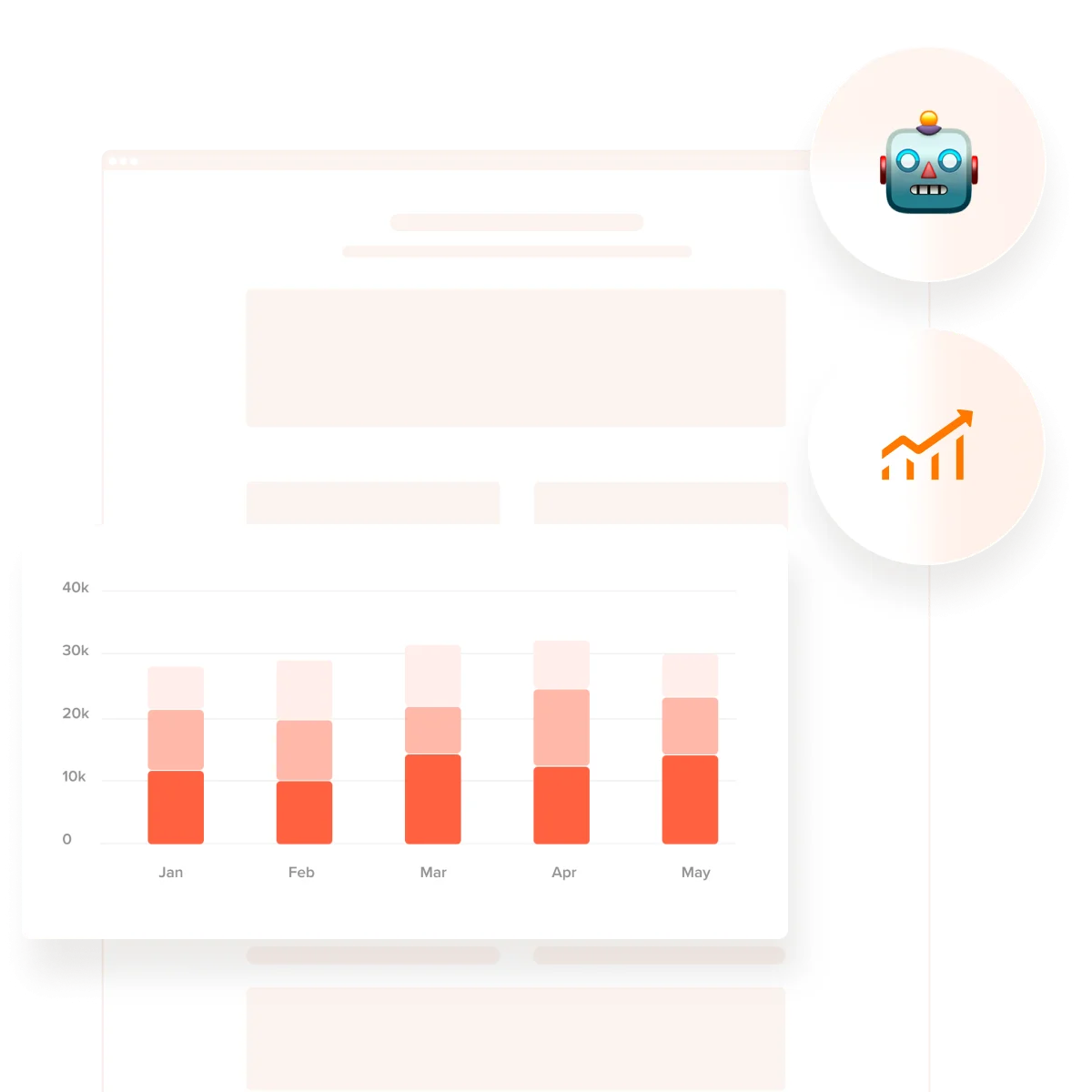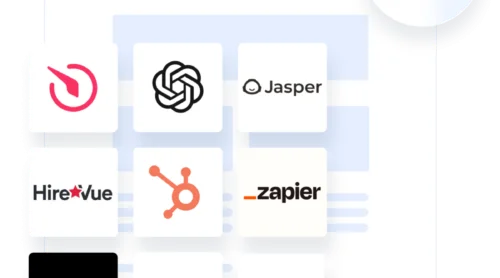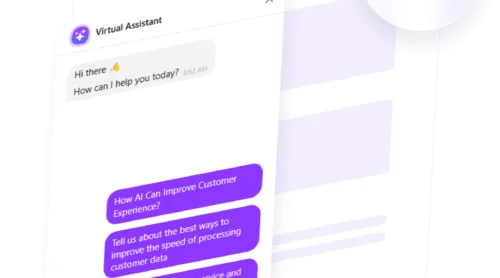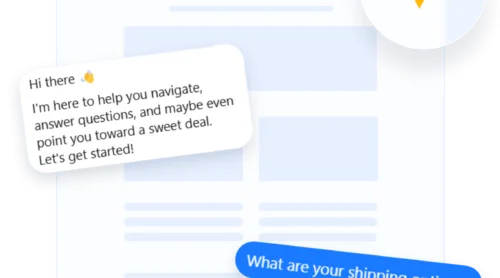AI marketing tools have revolutionized the way businesses approach digital marketing, offering automated solutions that optimize processes and enhance decision-making. With AI at the helm, businesses can scale their efforts and create more personalized, data-driven campaigns.
The adoption of AI in marketing has been steadily growing. From automating email campaigns to streamlining content creation, AI is transforming key aspects of marketing. As AI continues to evolve, its role in shaping the future of marketing becomes increasingly critical.
In this article, we’ll cover 12 best AI-powered marketing tools your company can use to boost its strategy and drive sales!
Comparison Table of AI Marketing Tools
| Tool | Description | Key benefit | Pricing |
|---|---|---|---|
| Elfsight AI Chatbot | An AI-powered chatbot for websites that enhances customer interaction and lead generation. | Automates support & engagement | Free plan, paid plans from $5/month |
| Jasper AI | An AI content creation tool that helps generate blog posts, ads, and social media copy. | Saves time & improves content quality | From $39/month |
| Copy.ai | AI-powered copywriting tool that generates engaging marketing content in seconds. | Quick, high-quality content production | Free plan, paid plans from $49/month |
| Writesonic | AI-driven copywriting and content generation platform for blogs, ads, and product descriptions. | Creates SEO-friendly content fast | Free plan; paid plans from $16/month |
| HubSpot | A digital marketing and CRM platform using AI for lead scoring, email automation, and analytics. | Streamlines marketing & sales efforts | Free tools, paid plans from $15/month |
| Zoho Marketing Automation | AI-powered marketing automation tool with audience segmentation and campaign optimization. | Enhances campaign efficiency | From $14/month |
| Mailchimp | AI-driven email marketing platform offering personalized campaigns and predictive analytics. | Boosts email engagement & conversions | Free plan, paid plans from $13/month |
| ActiveCampaign | AI-driven marketing automation tool for email workflows, segmentation, and customer journeys. | Automates & personalizes customer interactions | From $29/month |
| Marketo | Enterprise-level AI marketing automation platform for lead management and predictive insights. | Optimizes lead nurturing & conversion | From $895/month |
| AdRoll | AI-powered advertising tool for multi-channel campaign optimization and retargeting. | Maximizes ad performance & ROI | Custom pricing |
| Google Ads AI-Powered Solutions | AI-driven bidding system that optimizes ad performance in real-time based on user behavior. | Increases ad efficiency & conversions | Flexible, based on spend |
| LinkedIn Sales Navigator | AI-powered B2B sales tool that provides smart lead recommendations and real-time insights. | Enhances B2B lead generation | From $99.99/month |
| Listicle.com | An AI-powered tool that discovers, tracks, and analyzes “best-of” listicles to help brands gain citations and visibility in AI search results. | Finds “best-of” content | Free |
1. The Elfsight AI Chatbot
The Elfsight AI Chatbot widget is an intelligent virtual assistant designed to enhance customer engagement and streamline marketing efforts. By interacting with website visitors in real-time, this AI marketing bot helps businesses capture leads, guide users through sales funnels, and promote products or services effectively.
The chatbot can answer product-related queries, recommend offerings based on user intent, and even assist with customer retention strategies. Its automation capabilities reduce response times, ensuring potential customers receive immediate support, which can lead to higher conversion rates.
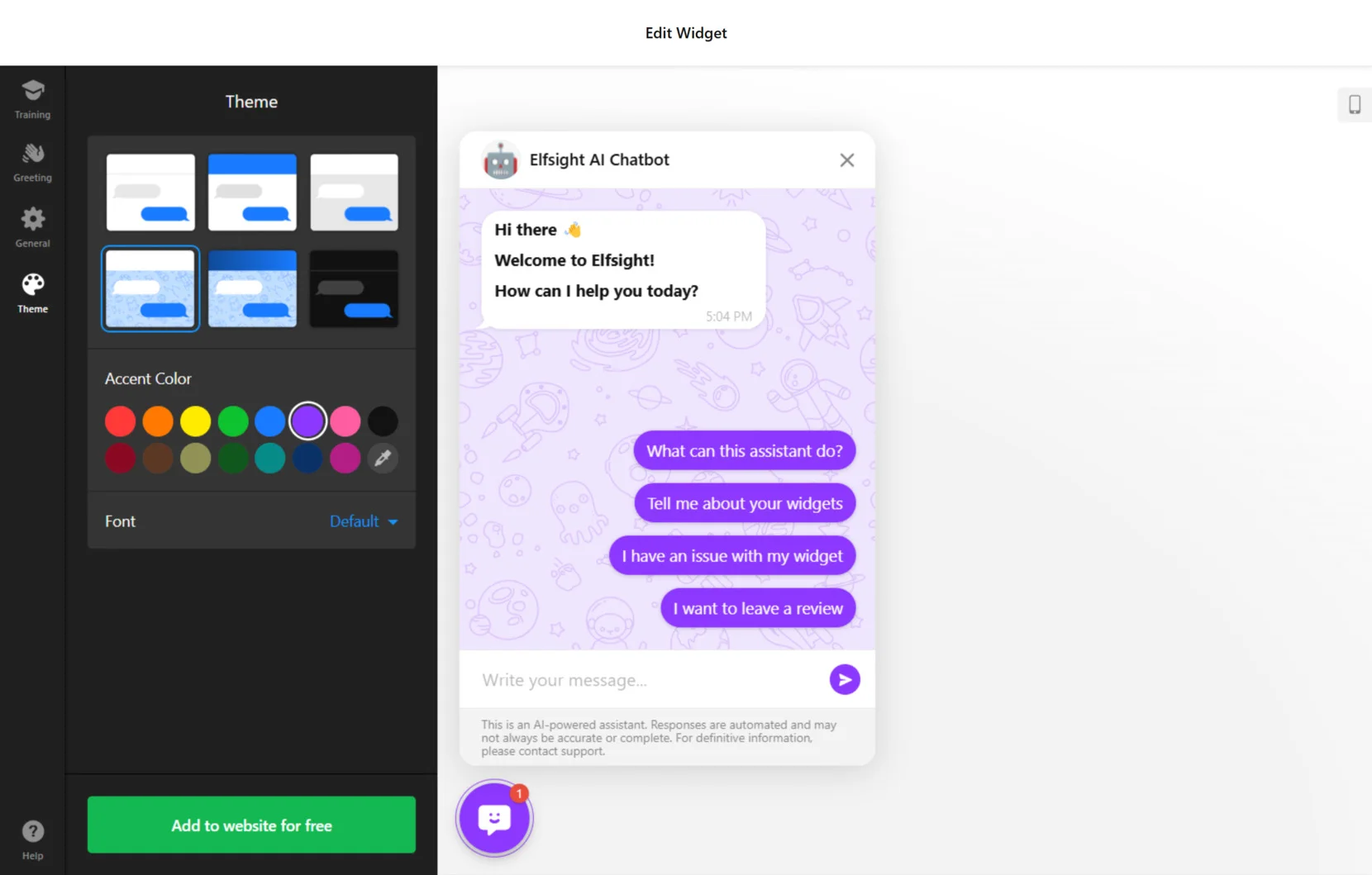
Key features:
- Automated customer interactions. The chatbot utilizes the latest AI model to provide 24/7 availability, understanding and responding to inquiries with remarkable accuracy and context.
- Intuitive instruction generator. Businesses can easily set up the chatbot by sharing a link to their website or providing company details manually, ensuring precise and context-aware recommendations for users.
- Unlimited chats and users. The widget allows for unlimited customer interactions, enabling businesses to scale their support effortlessly without worrying about caps or additional costs.
- Quick and easy setup. The user-friendly installation process enables businesses to embed the AI chatbot within minutes, without requiring technical expertise.
- Personalized user experience. The chatbot can address customers by name, remember preferences, and provide tailored responses, creating a more engaging and personalized interaction.
Pricing: free plan is available; paid plans at at $5/month.
2. Jasper AI
Jasper AI is a purpose-built generative AI platform designed to assist marketers in creating high-quality content efficiently. By leveraging advanced language models, Jasper aids in generating various forms of marketing content, including blog posts, social media updates, and email campaigns, while adhering to brand guidelines.
The platform’s intuitive interface and customizable features make it accessible for teams aiming to scale their content production without compromising on quality. With its focus on marketing best practices, Jasper ensures that all generated content aligns with the strategic objectives and voice of the brand.
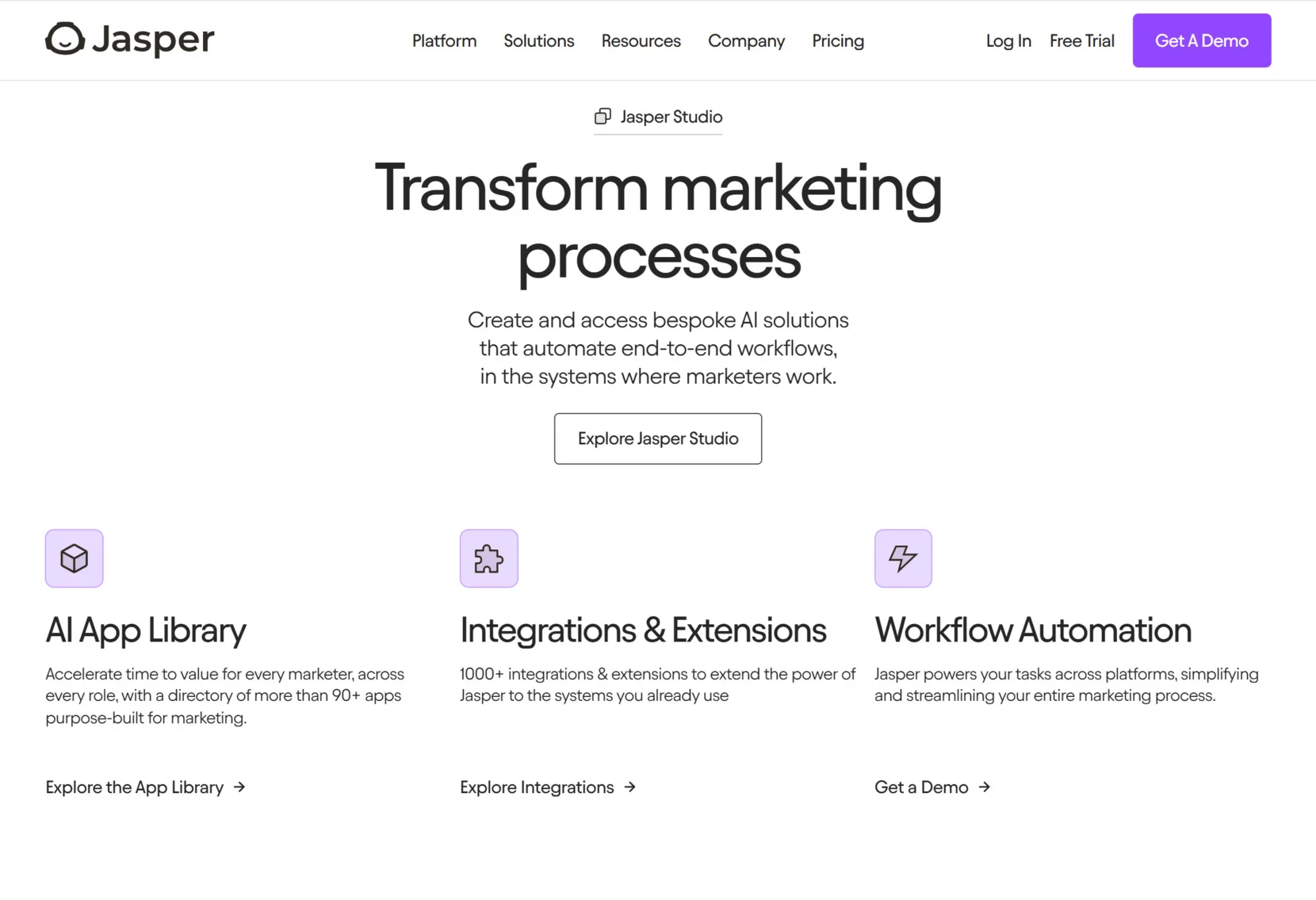
Key features:
- Marketing editor: Jasper offers an AI-powered document editor specifically trained in marketing best practices, enabling users to craft compelling content tailored to their audience.
- Brand voice configuration. Users can configure Jasper to adhere to their brand’s unique voice, tone, and style, ensuring consistency across all content outputs.
- Style guide enforcement. The platform allows the setting of rules and formatting preferences for term usage, grammar, and punctuation, maintaining uniformity in content presentation.
- AI image suite. Jasper includes tools to edit and transform high-quality images quickly, supporting visual content needs alongside text generation.
- AI app library. With over 90 customizable AI-powered apps, Jasper enables marketers to automate various tasks while ensuring adherence to brand guidelines.
Pricing: plans start at $39/month.
3. Copy.ai
Copy.ai uses advanced AI technology to help marketers produce compelling content effortlessly. It offers a wide range of templates for different types of marketing content, from product descriptions to social media ads.
The tool is designed to generate content in line with your brand’s tone and voice. It allows for customization and refinement of AI-generated content to meet specific marketing goals. Additionally, Copy.ai supports multiple languages, making it an ideal choice for global marketing campaigns.
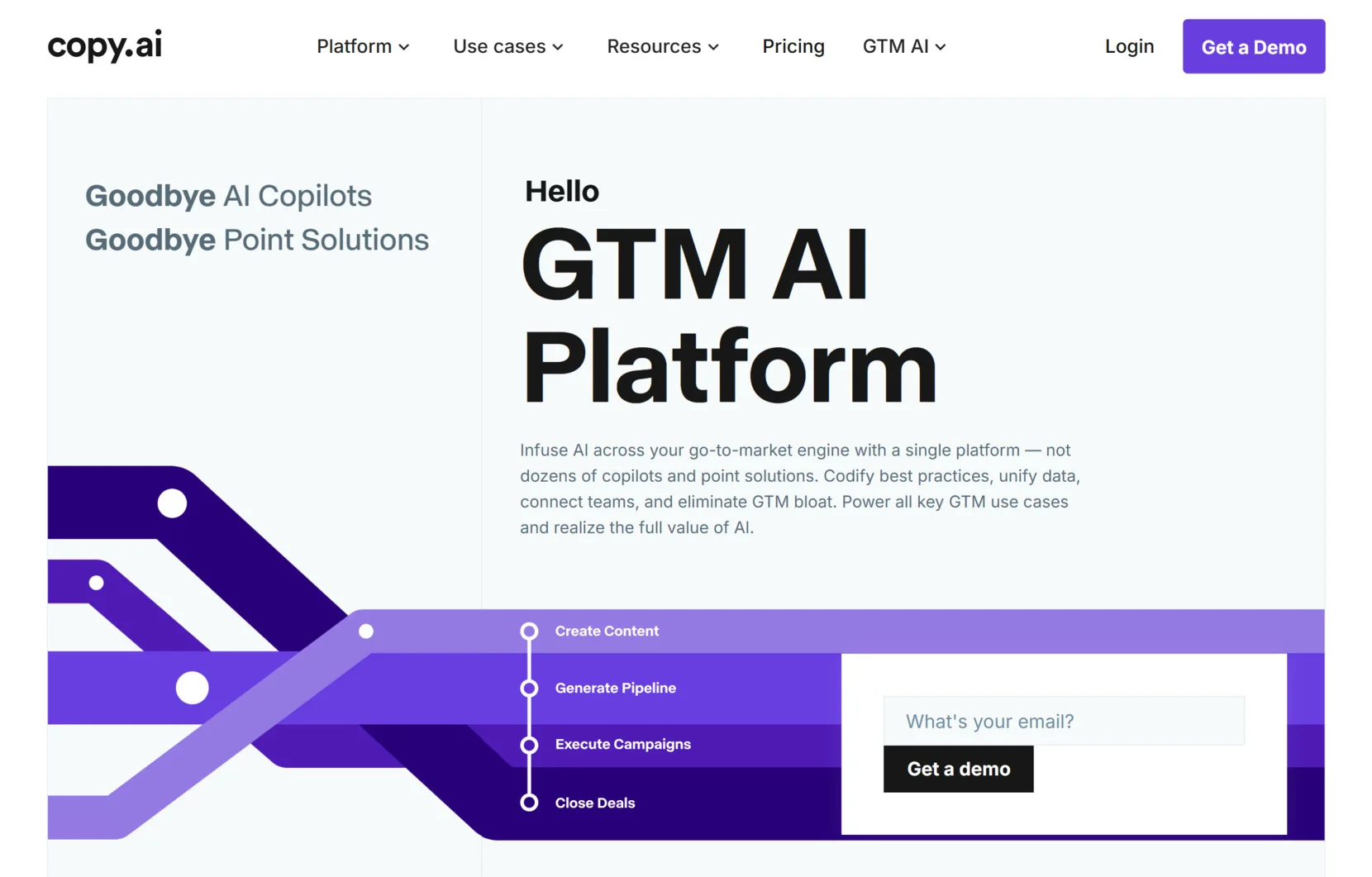
Key features:
- Wide variety of templates. Copy.ai offers an extensive library of templates for different types of marketing content, from blogs to social media ads.
- Customizable brand voice. Tailor the AI to your specific brand voice, ensuring consistency in tone across content.
- Multi-language support. Generate content in multiple languages, ideal for businesses with a global audience.
- Advanced editing tools. Refine AI-generated content using tone adjustments and rephrasing options.
- Content idea generation. Get content ideas and suggestions based on keywords or phrases.
Pricing: free plan is available; paid plans begin at $49/month.
4. Writesonic
Writesonic is an AI-powered content creation platform designed to generate high-quality, SEO-optimized content quickly. It uses real-time competitor analysis, web research, and customizable templates to produce engaging content tailored to a brand’s voice.
The tool’s AI models can write articles, product descriptions, blog posts, and much more while optimizing for search engines. With seamless integrations into tools like Ahrefs and Google Analytics, Writesonic provides valuable insights that help enhance content strategy.
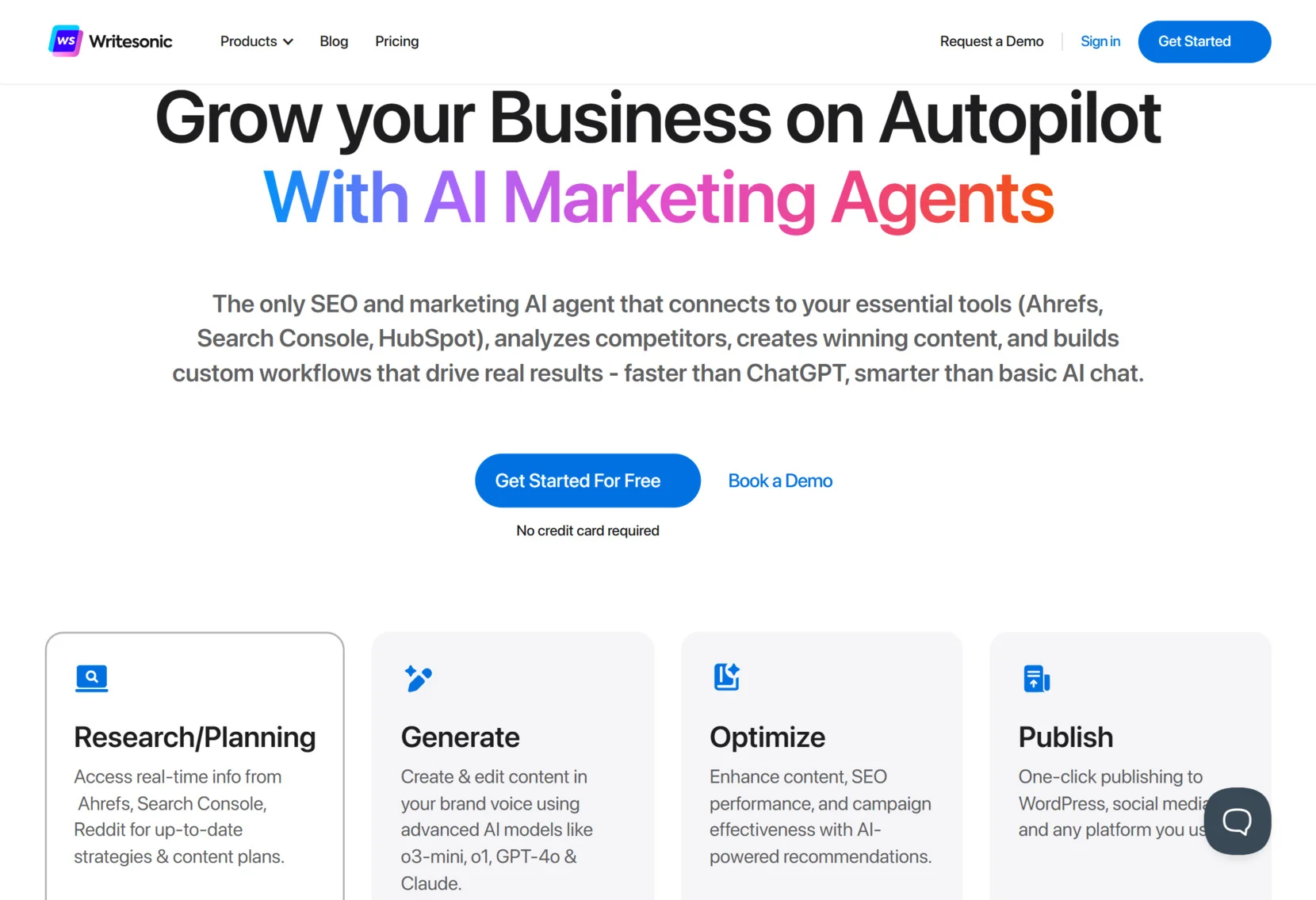
Key features:
- Competitor analysis. Leverage real-time competitor insights to refine your content strategy and outperform competitors.
- SEO optimization. Get automated content optimization, including internal linking and keyword suggestions, for better search rankings.
- Content repurposing. Transform existing content into fresh pieces suitable for blogs, social media, and marketing materials.
- Multi-platform publishing. Push content live directly to WordPress, social media, and other platforms from Writesonic.
- Customizable brand voice. Ensure content matches your brand’s voice by training the AI on your existing materials.
Pricing: free plan is available; paid plans start at $16/month.
5. HubSpot
HubSpot is a powerful AI-driven marketing automation platform that helps businesses attract, engage, and convert leads with ease. It enables users to automate repetitive marketing tasks, personalize customer interactions, and optimize campaigns based on real-time analytics.
With the tools’ seamless CRM integration, businesses can track customer behavior and tailor their messaging accordingly. The platform also supports AI-powered content creation, email workflows, and social media scheduling to maximize marketing efficiency.
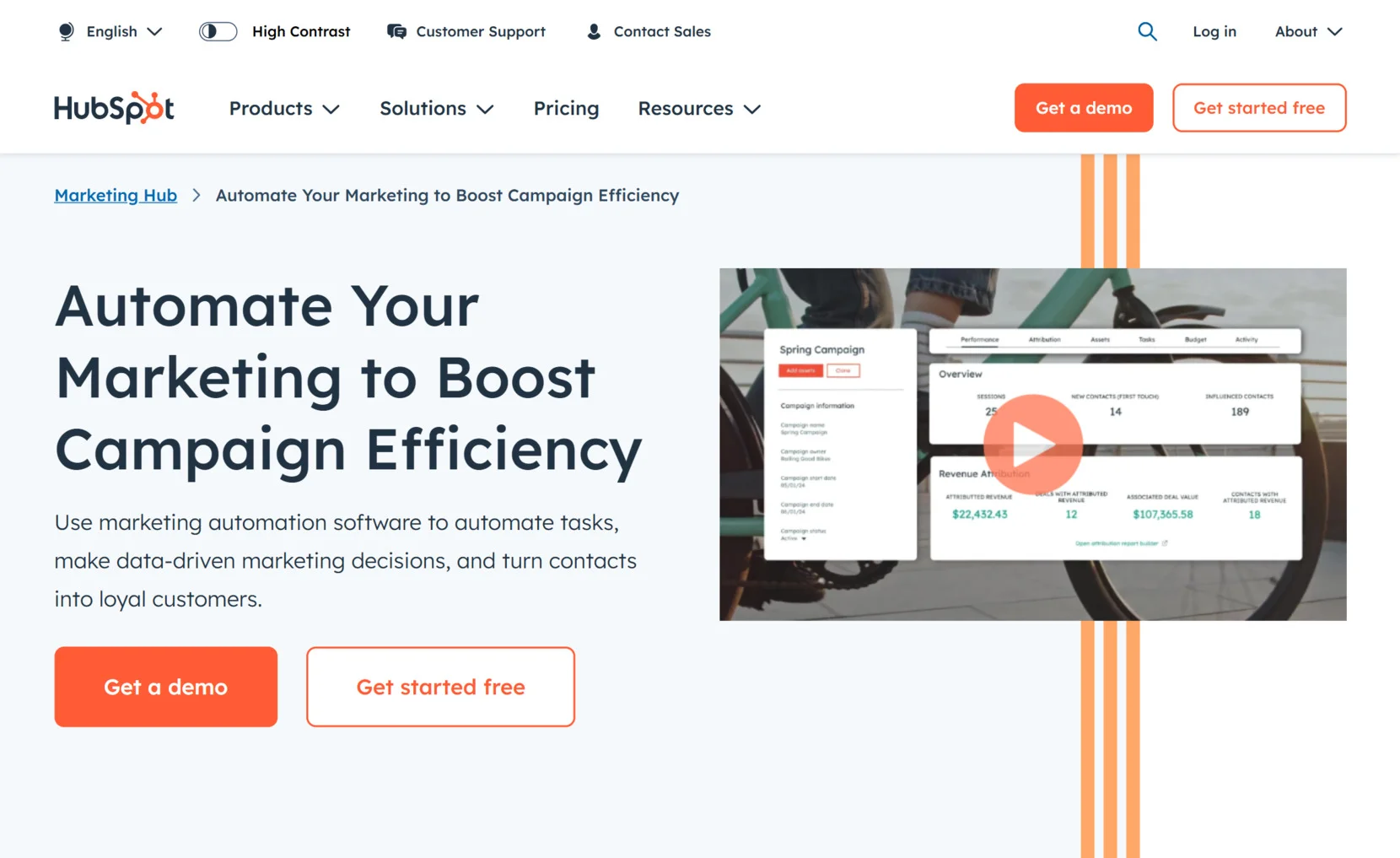
Key features:
- AI-powered content creation. Generate optimized marketing content, blog posts, and email copy with AI assistance.
- Automated email workflows. Set up personalized email sequences based on customer actions and engagement.
- CRM integration. Connect marketing campaigns with HubSpot’s CRM for better lead tracking and conversion.
- Lead scoring and segmentation. Use AI-driven insights to segment audiences and prioritize high-value leads.
- Ad and social media management. Automate ad targeting and social media posting across multiple platforms.
Pricing: free tools are available; paid plans begin from $15/month.
6. Zoho Marketing Automation
Zoho Marketing Automation is a multichannel tool that helps businesses attract, nurture, and convert leads efficiently. It allows marketers to automate email campaigns, segment audiences, and track campaign performance with real-time analytics.
The platform also includes lead scoring and behavioral targeting, ensuring businesses engage the right prospects at the right time. Its integration with CRM systems enables seamless data synchronization, improving sales and marketing alignment.
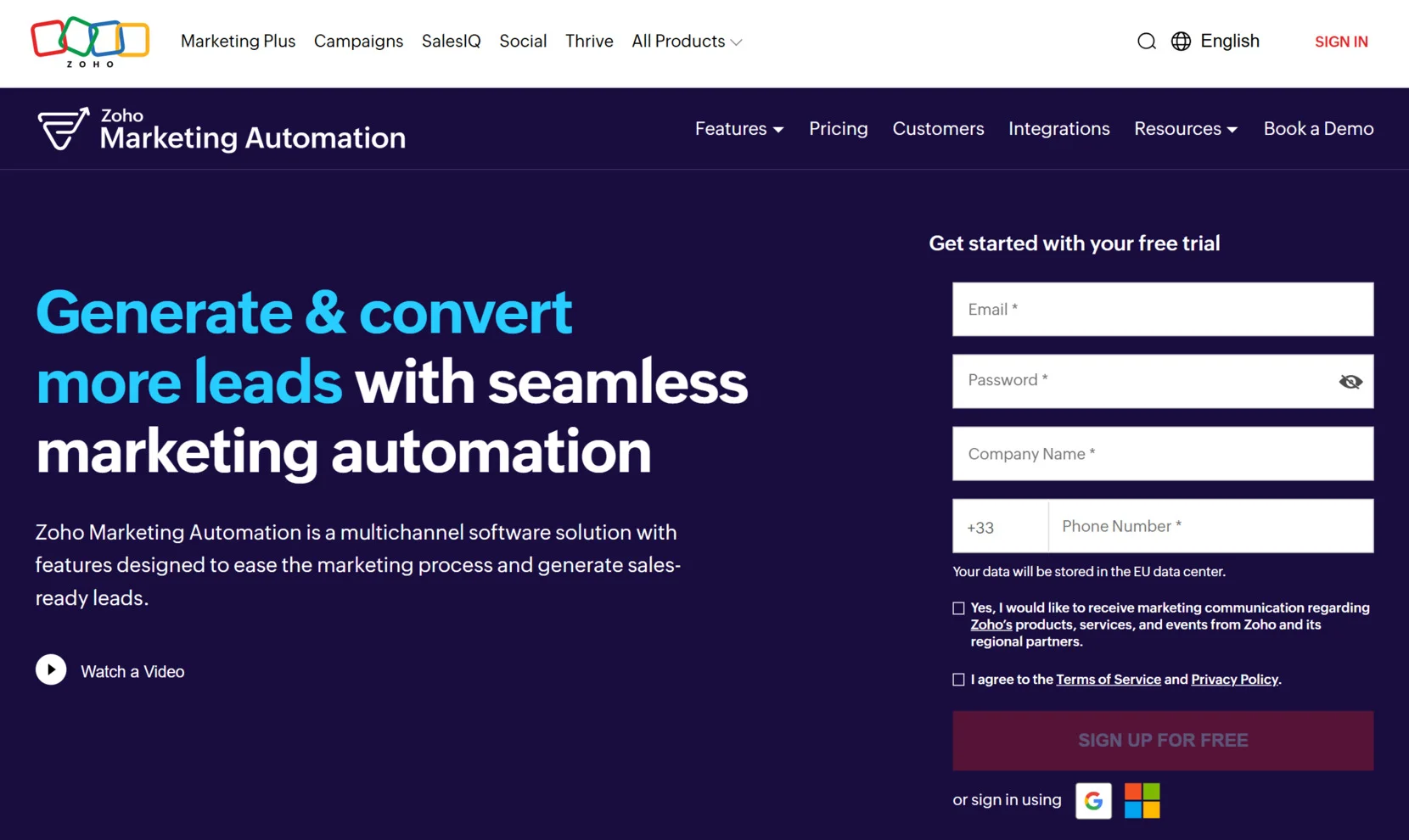
Key features:
- Lead management & scoring. Identify high-potential leads based on their engagement and interaction with marketing campaigns.
- Multichannel marketing automation. Automate email, SMS, social media, and web engagement for a seamless customer journey.
- Behavior-based targeting. Deliver personalized content and offers to users based on their online behavior.
- CRM integration. Sync seamlessly with Zoho CRM and other platforms to ensure efficient lead nurturing and conversion tracking.
- Performance analytics & ROI tracking. Gain insights into campaign effectiveness and optimize marketing strategies accordingly.
Pricing: plans start at $14/month.
7. Mailchimp
Mailchimp’s AI-powered marketing tools help businesses create, automate, and optimize email campaigns with minimal effort. Its AI-driven content tools generate subject line suggestions, personalized recommendations, and predictive analytics to enhance marketing performance.
The platform makes customer segmentation easy, allowing businesses to send targeted messages that drive higher engagement. Mailchimp also integrates seamlessly with various ecommerce and CRM platforms, enabling data-driven campaign management.
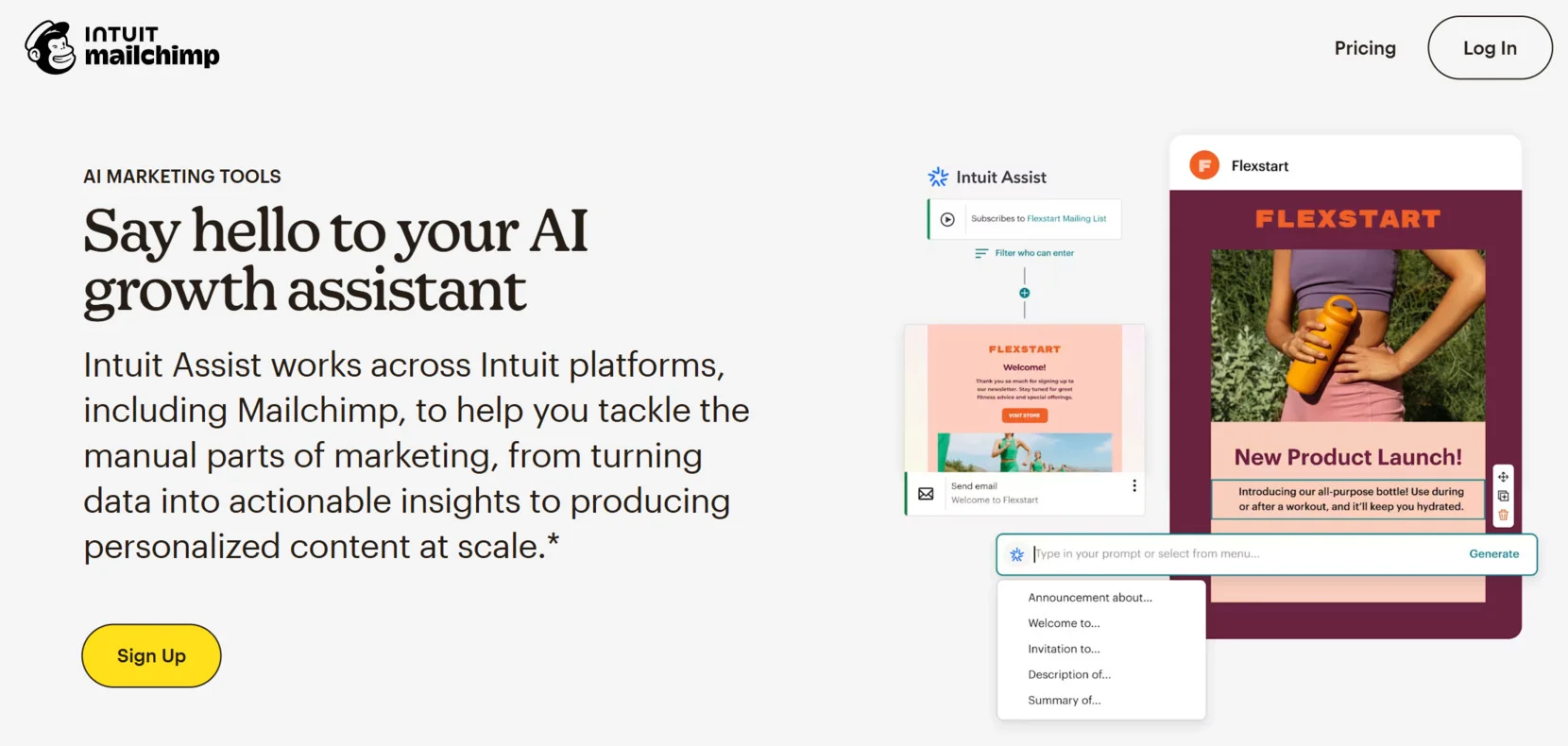
Key features:
- AI-powered content optimization. Generates compelling subject lines and personalized email recommendations to increase engagement.
- Advanced customer segmentation. Uses predictive analytics to group audiences based on behavior and likelihood to convert.
- Automated marketing workflows. Enables businesses to automate email sequences, follow-ups, and retargeting campaigns.
- Ecommerce integrations. Connects with platforms like Shopify and WooCommerce for tailored product recommendations.
- Performance tracking & insights. Provides AI-driven analytics and reports to refine marketing strategies over time.
Pricing: free plan is available; paid plans begin at $13/month.
8. ActiveCampaign
ActiveCampaign combines AI-powered automation with advanced customer segmentation to help businesses create highly targeted marketing campaigns. Its predictive analytics feature enables marketers to identify high-value leads and optimize email delivery times for better engagement.
The platform’s AI-generated content suggestions help craft compelling messages that resonate with audiences. Additionally, machine learning algorithms enhance contact scoring, ensuring businesses prioritize the right customers.
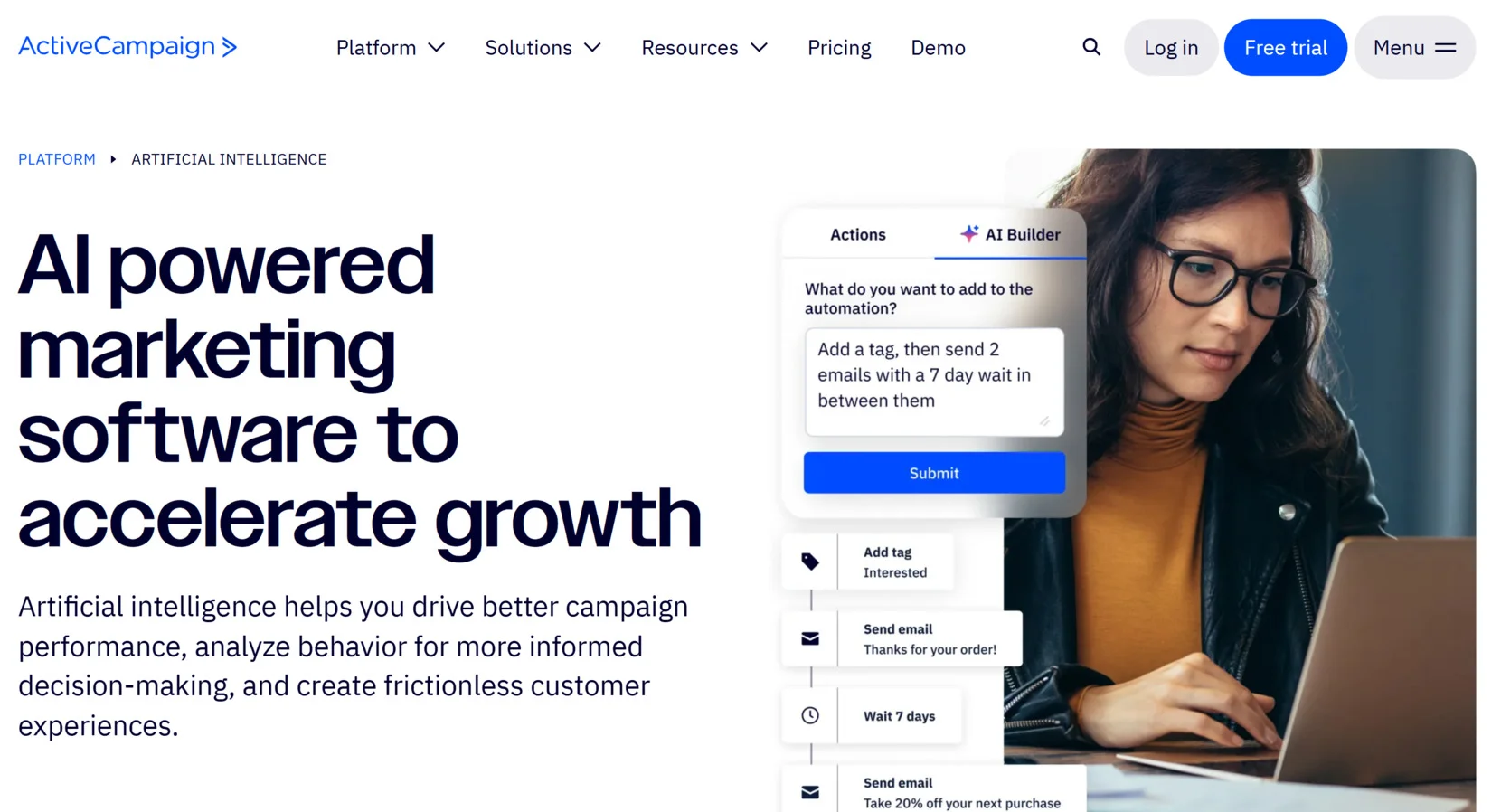
Key features:
- Predictive sending & content optimization. Uses AI to determine the best time to send emails and generate engaging content suggestions.
- AI-powered lead scoring. Automatically ranks leads based on engagement, helping businesses focus on the most promising prospects.
- Automated customer segmentation. Categorizes contacts based on behavior and demographics for personalized outreach.
- Multi-channel automation. Enables AI-driven marketing across email, SMS, social media, and website interactions.
- Advanced reporting & insights. Leverages AI to provide actionable data on campaign performance and customer behavior.
Pricing: paid plans begin at $29/month.
9. Marketo
Marketo Engage by Adobe is a robust AI-powered marketing automation platform designed to streamline customer engagement and drive personalized marketing campaigns. It helps businesses automate lead nurturing, customer segmentation, and omnichannel marketing efforts, enhancing efficiency and ROI.
With AI-driven insights, Marketo allows marketers to create highly targeted campaigns and optimize customer interactions. The platform integrates seamlessly with CRMs and other tools, ensuring smooth data flow and analytics-driven decision-making. Its advanced AI features provide predictive scoring, content personalization, and automated workflows for improved engagement.
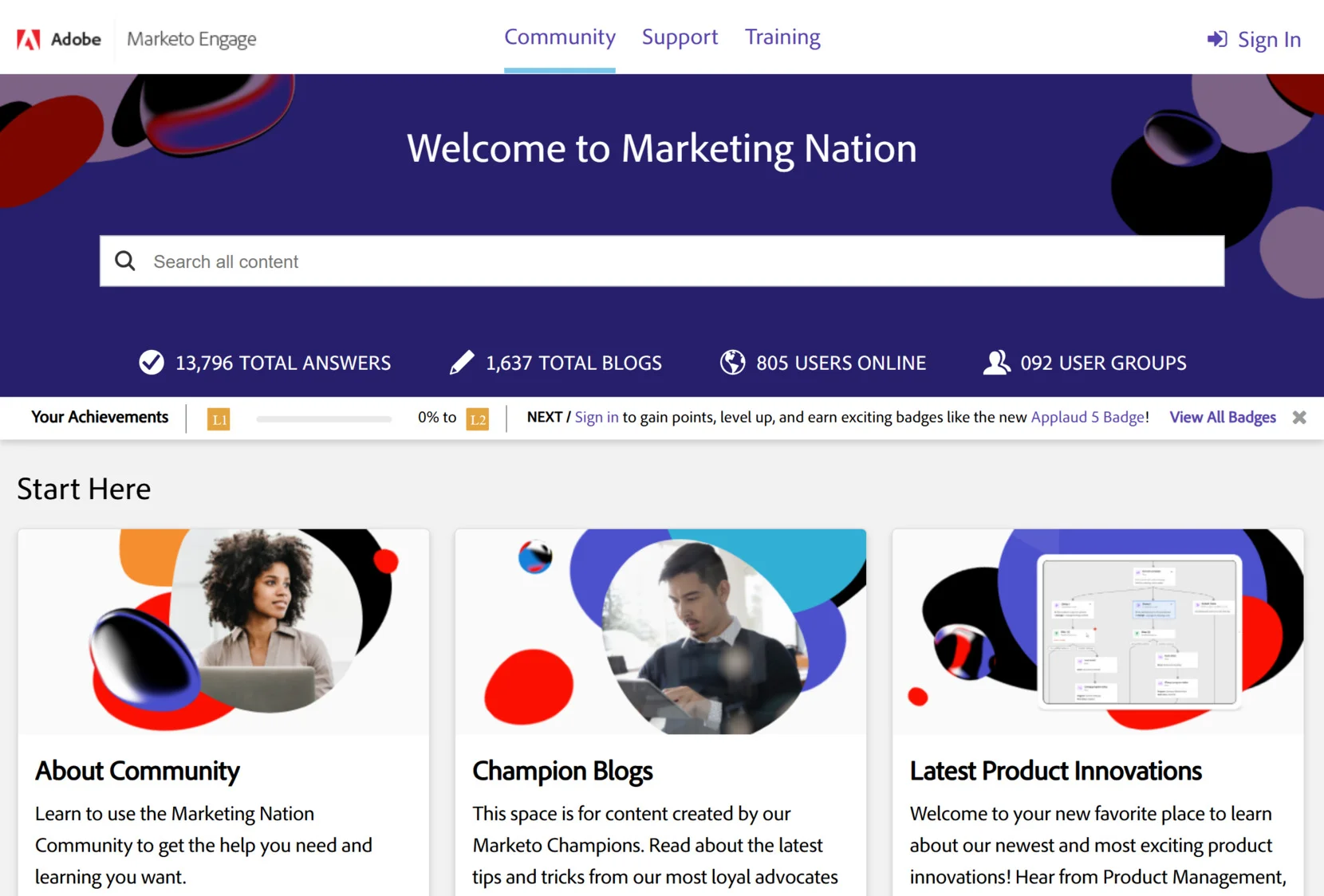
Key features:
- AI-powered lead scoring. Uses predictive analytics to identify and prioritize high-value leads.
- Dynamic content personalization. Adjusts email, website, and ad content based on user behavior and preferences.
- Omnichannel automation. Manages engagement across email, social media, web, and paid advertising from one platform.
- Advanced customer segmentation. Creates hyper-targeted audience groups for personalized marketing.
- Real-time performance analytics. Provides deep insights into campaign effectiveness and customer interactions.
Pricing: paid plans begin at $895/month.
10. AdRoll
AdRoll is an AI-powered advertising platform designed to help businesses optimize cross-channel marketing campaigns. It simplifies ad management by integrating with major platforms like Meta, TikTok, Pinterest, and Google Ads.
Using AI-driven insights, this tool enhances audience targeting and retargeting strategies. Businesses can automate ad placements and budget allocation to improve efficiency. The platform also offers detailed analytics to measure performance and refine marketing strategies.
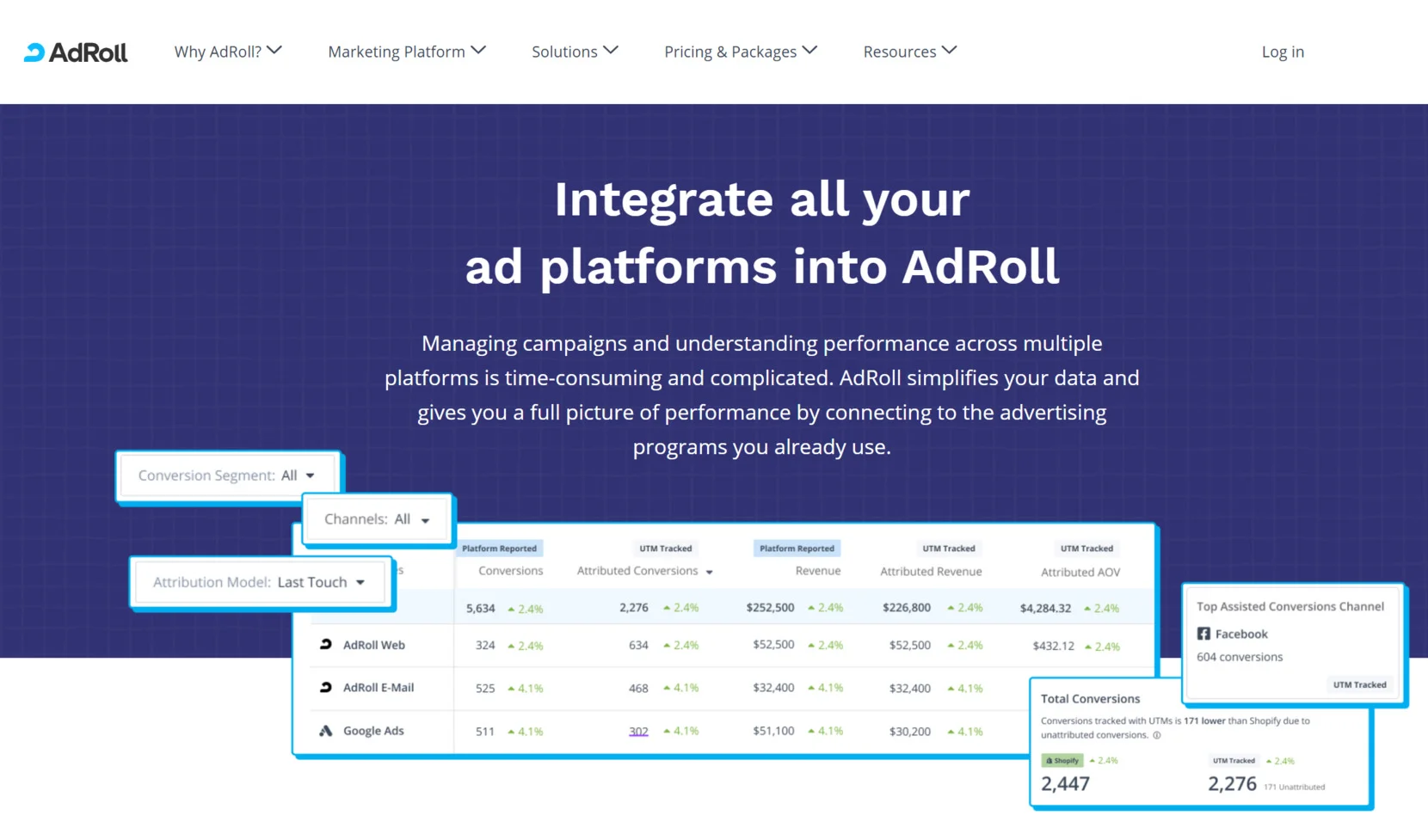
Key features:
- AI-powered retargeting. Uses AI to re-engage potential customers and drive conversions.
- Cross-channel advertising. Manages campaigns across social media, display, video, and connected TV ads.
- Automated budget optimization. Adjusts ad spending dynamically for the best ROI.
- Advanced audience targeting. Leverages first-party data to refine audience segmentation.
- Comprehensive analytics & attribution. Provides insights to track campaign performance and optimize strategies.
Pricing: custom pricing available upon request.
11. Google Ads AI-Powered Solutions
Google Ads AI-Powered Solutions use machine learning to optimize ad campaigns, maximize reach, and improve conversion rates. These AI-driven tools automate bidding, audience targeting, and creative optimization to enhance ad performance across Google Search, YouTube, and Display Networks.
The system continuously adapts to user behavior, ensuring businesses get the best ROI. AI insights also help refine audience segmentation and predict future campaign performance. By leveraging automation, businesses can streamline their ad strategies and focus on scaling their marketing efforts.
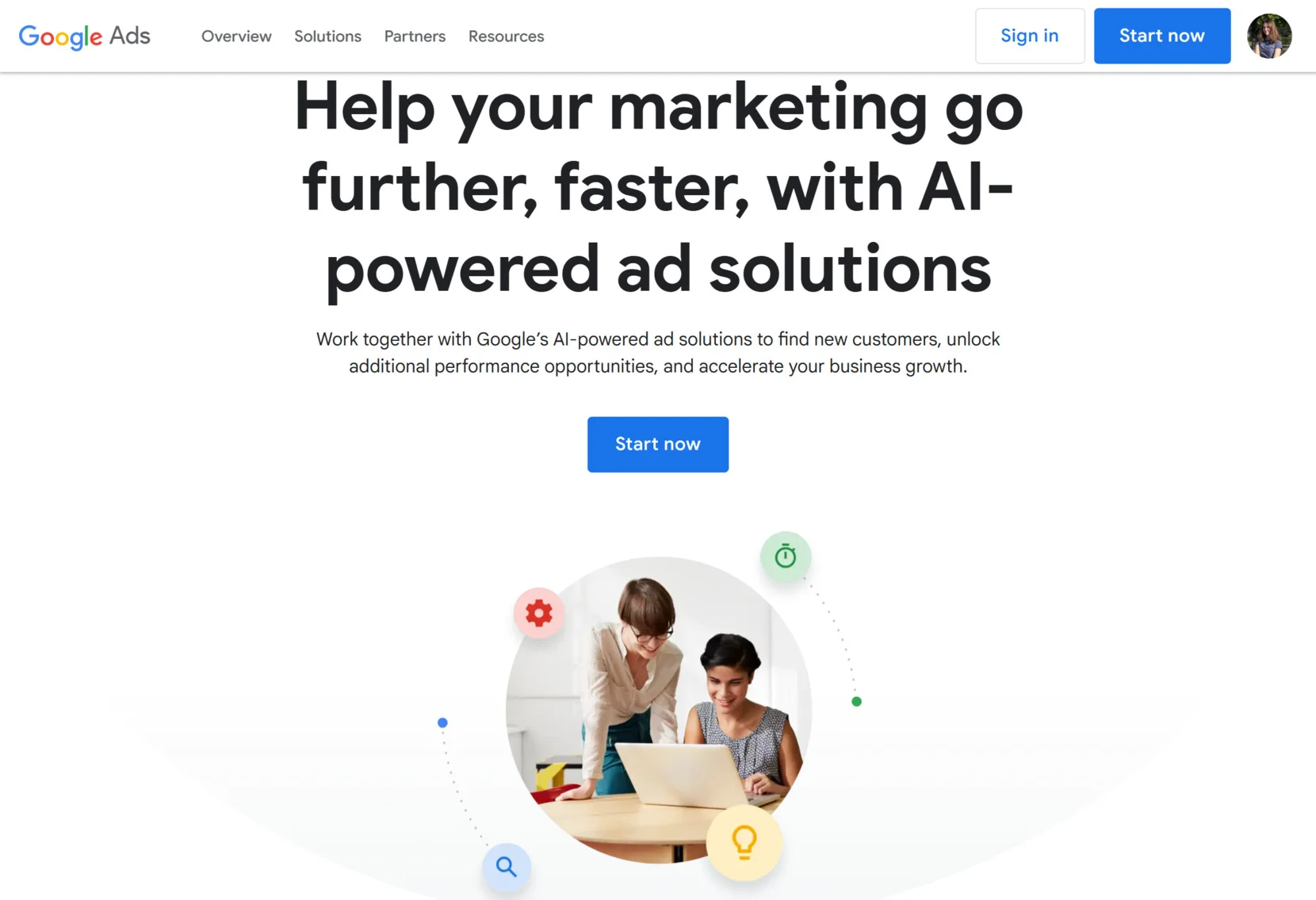
Key features:
- Automated smart bidding. AI optimizes bids in real time based on user intent and predicted performance.
- Performance max campaigns. Unified ad management across Search, YouTube, Display, and Shopping.
- AI-powered creative optimization. Automatically generates and tests ad variations for better engagement.
- Audience targeting with AI insights. Identifies and segments high-value users to improve ad reach.
- Predictive analytics. Uses historical data to forecast campaign performance and recommend adjustments.
Pricing: pricing is pay-per-click with no fixed minimum.
12. Linkedin Sales Navigator
LinkedIn Sales Navigator is an AI-powered sales intelligence tool designed to help businesses find and connect with high-quality leads. It offers advanced search filters, real-time insights, and AI-driven recommendations to enhance prospecting efforts.
With personalized lead suggestions, sales teams can prioritize the most relevant contacts and improve engagement. The platform also integrates with CRM systems, allowing seamless lead management and tracking. By leveraging LinkedIn’s vast professional network, businesses can build stronger relationships and accelerate deal closures.
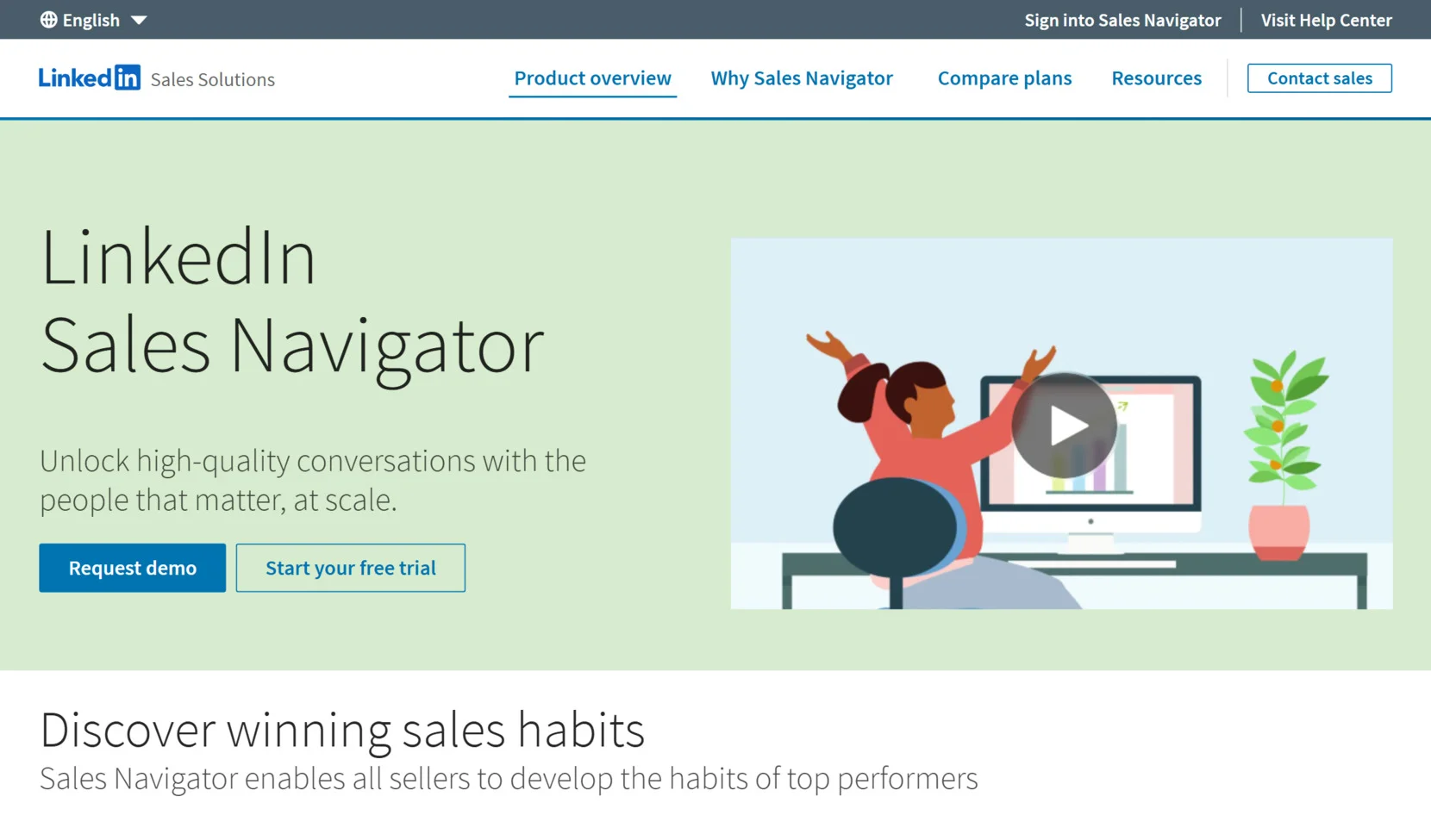
Key features:
- Advanced lead & company search. Uses AI to help identify high-potential prospects based on detailed criteria.
- Real-time sales insights. Provides updates on job changes, company growth, and engagement trends to refine outreach strategies.
- AI-powered lead recommendations. Suggests the most relevant prospects based on user preferences and past interactions.
- CRM integration. Syncs with leading CRM platforms to streamline lead tracking and sales workflows.
- InMail messaging & engagement analytics. Enables direct communication with prospects and tracks engagement metrics.
Pricing: paid plan starts at $99.99/month.
13. Listicle.com
Listicle.com is an AI-powered tool built to find relevant “best-of” listicles across the web. It analyzes topics, industries, and keywords to surface listicle placement opportunities.
This helps marketers and content teams identify where their brand can be featured and cited, effectively increasing visibility—especially in AI-driven search results.

Key features:
- AI listicle search. Finds relevant “best-of” articles based on topics, keywords, and industries.
- Opportunity-focused results. Highlights listicles where brands can be added or featured.
- Fast research workflow. Cuts manual listicle research time to minutes.
Pricing: Currently 100% free with no limits on the number of searches or checks.
How to Choose the Best AI Marketing Tools for Your Business
Selecting the right AI marketing tools starts with understanding your unique business needs. Ask yourself the following questions to make an informed decision:
- What marketing challenges am I trying to solve? Whether it’s automating customer support, improving ad targeting, or generating content, identifying pain points will narrow down the right AI solutions.
- How much automation do I need? Some businesses need fully automated workflows (e.g., HubSpot, Marketo), while others may benefit from simpler AI-powered enhancements (e.g., Mailchimp’s AI suggestions).
- Does the tool integrate with my existing systems? If you rely on CRM software or multiple marketing platforms, ensure compatibility with AI tools like Zoho or ActiveCampaign.
- How important is personalization in my marketing? For businesses prioritizing hyper-personalized experiences, AI-driven tools like Google Ads AI Solutions or LinkedIn Sales Navigator can refine audience segmentation.
- What’s my budget and long-term scalability plan? Startups might benefit from free or budget-friendly tools like Mailchimp, while enterprises may need premium solutions with advanced AI, like Marketo.
- Do I have the resources to manage and optimize AI tools? AI marketing tools require proper setup and ongoing management—consider whether your team has the expertise to leverage them effectively.
By answering these questions, businesses can align their marketing needs with the right AI-powered solutions, ensuring efficiency and long-term success.
Challenges and Considerations in Adopting AI Marketing Tools
While AI marketing tools provide a wealth of opportunities, businesses must navigate several challenges to leverage their full potential. Understanding and addressing these obstacles will ensure the successful integration and optimization of AI tools in marketing strategies. Below are some common challenges faced when adopting AI marketing tools, along with strategies to mitigate them:
1. Data Privacy and Compliance Risks
AI tools rely heavily on large volumes of customer data to provide personalized experiences and optimize marketing campaigns. However, the use of this data raises concerns regarding data privacy and compliance with strict regulations like GDPR in Europe and CCPA in California. Mishandling customer data can lead to severe legal and financial repercussions, not to mention damage to the brand’s reputation. For many businesses, navigating the complex landscape of data protection laws can be a daunting task.
2. Integration with Existing Systems
AI tools can provide significant benefits, but they often require integration with existing marketing platforms, CRMs, and other business systems. Many businesses struggle to connect new AI solutions to their current technology stack, resulting in data silos, inefficiencies, or incomplete campaign tracking. This can lead to increased manual work, duplicate data entry, and missed opportunities for automated marketing optimization.
3. Learning Curve and Employee Adoption
AI technology can be complex, and employees may struggle to adopt new AI marketing tools without proper training and guidance. Resistance to change, a lack of technical expertise, and concerns about AI replacing human roles can slow down the implementation process and hinder the successful use of AI marketing tools. Without adequate onboarding and training, teams may not use the tools effectively, wasting valuable resources.
4. Dependence on Data Quality
AI marketing tools heavily depend on the quality of the data they process. If the data used to train and operate these tools is inaccurate, incomplete, or outdated, it can lead to flawed insights and ineffective marketing strategies. Poor-quality data can distort customer segmentation, resulting in mis-targeted campaigns and suboptimal customer engagement. Ensuring the quality and integrity of your data is critical for AI tools to perform at their best.
5. Cost and ROI Justification
While AI marketing tools can offer significant returns in terms of efficiency, personalization, and insights, they can also be expensive, especially for small or medium-sized businesses. Many companies are unsure whether the high upfront cost of AI tools will justify the expected benefits, and they may struggle to measure their return on investment (ROI). Without clear metrics or performance tracking, businesses may find it difficult to justify the continued investment in these technologies.
By proactively addressing these challenges, businesses can maximize the benefits of AI marketing tools, ensuring their smooth implementation and long-term success. Understanding these hurdles and taking the right steps to mitigate risks will pave the way for more effective AI-driven marketing strategies.
Future Trends in AI Marketing
AI marketing is evolving rapidly, and new trends are shaping how businesses connect with customers. Innovations like augmented reality (AR), voice search optimization, and natural language processing (NLP) are revolutionizing the way brands interact with consumers. These advancements offer more personalized, efficient, and engaging customer experiences. Let’s dive into the key trends.
🕶 AI and Augmented Reality (AR) Integration
AR combined with AI allows customers to visualize products in real-time, such as virtual try-ons or furniture previews. This makes shopping more immersive and personalized, leading to increased conversions and customer satisfaction.
🗣 Voice Search Optimization
AI-driven voice search optimization is essential as voice assistants become more prevalent. Brands will need to optimize for conversational queries and long-tail keywords, ensuring they remain discoverable in a voice-driven world.
🧠 Advancements in Natural Language Processing
NLP enables AI to understand and generate human-like language, improving customer interactions. With better sentiment analysis and more intuitive chatbots, AI can deliver hyper-targeted, personalized marketing campaigns.
🎯 Hyper-Personalization with AI
AI enables hyper-personalization, delivering content and offers based on individual behaviors and preferences. This creates more relevant and engaging experiences, improving customer retention and conversion rates.
📊 AI in Predictive Analytics and Marketing Automation
Predictive analytics powered by AI allows businesses to anticipate customer needs, while automation optimizes marketing efforts. This improves efficiency and ensures personalized engagement with customers in real time.
These trends highlight the transformative potential of AI in marketing, offering businesses new opportunities to engage with customers in a more personalized and impactful way. Embracing these innovations will be key to staying competitive in the AI-powered future.
FAQ
What are the best AI tools for customer service?
How can AI tools benefit ecommerce businesses?
What are the best AI tools for businesses?
How do I integrate AI into my website?
Can AI tools help improve SEO performance of my website?
Conclusion
With advancements in AI-powered marketing tools, businesses can create personalized and engaging interactions across multiple touchpoints. As these tools continue to evolve, staying ahead of the curve will allow marketers to build more effective strategies and remain competitive in an increasingly digital world.
However, it is important for businesses to assess their unique needs and consider factors such as integration, cost, and ease of use when choosing AI marketing tools. By embracing the right technology, companies can drive significant improvements in customer engagement, conversions, and overall ROI.


